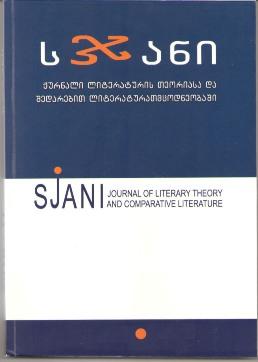შემოქმედებითი პროცესის რეალიები კომპარატივისტულ ძიებათა კონტექსტში
Composing Frames of the Creative Process in the Context of Comparative Studies
Author(s): Natia SikharulidzeSubject(s): Language and Literature Studies
Published by: ლიტერატურის ინსტიტუტის გამომცემლობა
Keywords: Galaktion Tabidze; intertextuality; Galaktionology.
Summary/Abstract: context, to analyze his works in consideration of foreign intertexts.Galaktion’s relation with European literature have been a research subject decadesago, but in spite of existing tradition, this issue requires more comprehensive, profoundand thorough study at the modern stage.Research Center for Galaktion of Shota Rustaveli Institute of Georgian Literaturehas started to prepare a new academic edition of GalaktionTabidze’s works since 2014.The precious reviewingof the handwritten sources of poet’s works, decoding of writtenacross texts and observing on the creative process have disclosed noteworthy, previouslyunknown facts for comparative research. Many cases have been revealed when at firstglance ordinary written-across texts made on autograph hint at the origin and genesis ofSemoqmedebiTi procesis realiebi komparativistul ZiebaTa konteqstSi32the work. Specification and analysis of these hints have revealed the genetic link of Galaktion’s poetry with the texts, closeness to which could not be supposed and disclosedwithout the study of manuscript sources.Observation on autograph of Galaktion’s three verses, survey of creative processhave demonstrated the inter-textual correlation of poet’s works with the ones of Ukrainian, German and Portuguese classical writers.In the first verse “That time has passed like a dream” Galaktion expresses hisattitude towards the past and changed political situation hinting Taras Shevchenko’s“Haidamaky”: If Galaktion’s verse is read against the background of epilogue lines of“Haidamaky”, it would be clear that the hidden idea is perceived behind the content ofthe work:Galaktion still wants to return old, though hard, time because it is linked withindependence.Against the background of the inspiration source - Schiller’s “Wilhelm Tall”, itis clear that Galaktion’s “Stormy weather” is not just the verse reflecting the enragingof the natural disaster, but it demonstrates the poet’s assessment of the Soviet 30s: consideration of the original source helps us to understand and perceive the other idea ofGalaktion’s verse. With reference to Schiller’s work, `Stormy Weather~ can be interpretedas an allegory. Galaktion Tabidze points to the tyranny, the cruelty of people and the divineretribution. We believe that the endings of both pieces of writing are very significant andmeaningful; in Schiller’s drama evil gets punished, and Tabidze’s poem ends on the notethat suggests eternity of the stormy weather. Thus, Understanding the main message ofWilliam Tell as a primary source helps us to analise and appreciate the deeper layers of theGeorgian poet’s work.As for the verse “Let it make noise” inspired by Luís de Camões’ “The Lusiads”,considering the intertext , in the Georgian poetry of the 1950s it is a landmark workexpressing critical attitudes towards socialist reality. Creative transformation of Galaktion’s this verse can be pictured as thus: original autographof Galaktion’s verse in whichCamões’ text is almost invariably repeated, reflects the poet’s spiritual state, his attitudetowards the totalitarian epoch. The final version of the verse expresses poet’s ethicalposition in the 50s, when Galaktion constantly thinks about “such forgotten component,as the literary conscience”.Camoens is a patriot poet. A man who gives up his life for prosperity of his homeland. In the epilogue of the Lusiads when he addresses to the king he is saddened becausethe heroic world depicted by his poetic genius has already become the part of the past,that the modernity does not leave space for heroism. People acquired the other, selfishgrabbing aspirations and all these are brought by the time, by the dark age which lacksin morality. There are two main reasons why Camoens asks Muse to become quiet. First,there is nothing left in his homeland that could make his genius admire and second, thereis no one who could truly enjoy and appreciate the beauty.As it seems, Galaktion finds similarities between Georgia of that period andCamoen’s homeland. As well as, in the mood of the Portuguese poet he reads his ownnaTia sixaruliZe33attitude towards the reality. That is how a strange parallel between the epoch of Camoensand Galaktion’s period of Georgia is created. Luis de Camoens’ stanzas are written inGalaktion’s note-book in the 30s. This fact is not only significant for dating the first andfinal editions, but here the main thing is that by translating this stanza the Georgian poetreveals his real attitude towards sovietized Georgia and towards the bloodthirsty epoch.I believe, that my research shed light not only on the genesis of specific worksas a result of observation on Galaktion’s creativity, but considering the intertextual correlation it is possible to perceive poet’s verses in a new way and in right context, i.e.tounderstand and interpret the poet’s real concept, which is no less important.In already published academic fifteen volumes of GalaktionTabidze’s poetry manyother facts are also reflected, which create the basis for similar studies. The work is proceeded for next volumes of the poet’s works and in accordance with disclosing otherinnovations, there is a hopeful expectation to expand the frame of comparative studiesand to proceed for Galaktiological investigation.SemoqmedebiTi procesis realiebi
Journal: სჯანი
- Issue Year: 2019
- Issue No: 20
- Page Range: 16-33
- Page Count: 18
- Language: Georgian

